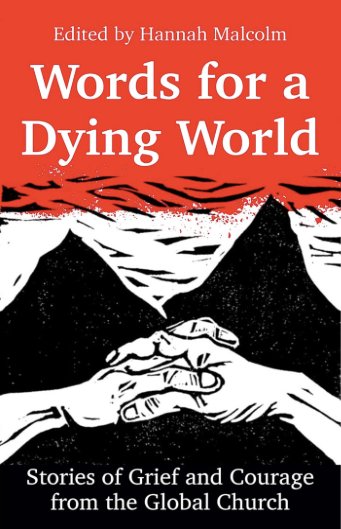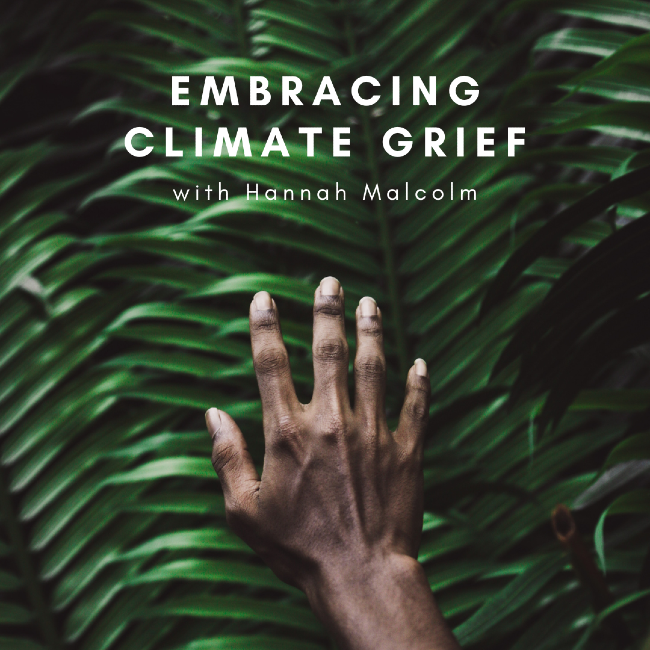This week, Louise and I are sharing excerpts (with permission) from the book, Words for a Dying World. It is a book of essays about grief. These essays, written by a diverse group of writers from around the world, are attempts to articulate what we have lost, and continue to lose, through our broken relationship with the earth, our fellow creatures, and our Creator. It is a challenging, and necessary, read. Hannah Malcolm, a priest in the Church of England and the book's editor, invites us to embrace grief because it unites us to God and "changes our nature and changes the nature of the things we grieve. They become to us what they already are to God: beloved."
For a new world to emerge, one defined by belovedness, we will have to face the pain and trauma of this world; we will have to grieve. I invite you to read the excerpts below, taken from Malcolm's introduction to the book. I've added short reflection questions between excerpts. And if you're interested, we recently interviewed Malcolm for our Earthkeepers podcast (Circlewood's other media project) - the link to that episode is at the end of this piece.
With you on the Way - James

Does your grief have a name?
"The last ten years has seen a sudden and rapidly growing interest in naming our experiences of climate breakdown, ecological collapse and animal extinction. There has been an explosion in the number of people reporting grief, anxiety and traumatic stress as a result of increased extreme weather events, the loss of flora and fauna, or a growing awareness of the existential threat that climate breakdown represents. These responses have been given various names, including but not limited to solastalgia, tierratrauma,1 environmental melancholia,2 and climate or ecological grief, mourning and anxiety. The diversity of terminology reflects the complexity of what we try to name. We are navigating the relationship between two constantly shifting concepts – human nature and non-human nature – and attempting to articulate a great trauma, where that relationship does not simply shift, but ruptures, breaks, disintegrates. And descriptions of this trauma have only recently emerged in English, though they have a longer human history. Still, we try to talk about it. Of course, we must."
1Glenn Albrecht, 2019, Earth Emotions: New Words for a New World, Ithaca, NY: Cornell University Press.
2Renee Lertzman, 2016, Environmental Melancholia: Psychoanalytic Dimensions of Engagement, Abingdon: Routledge.
Does your grief flow from the loss of particular creatures or places?
"Our grief about a dying world – however all-consuming it might feel – is not about death in abstraction. We grieve the death of particular things, whether creatures or places, and, until we understand this, our relationship between others and ourselves, we will continue to flounder in slogans and simplifications."
How do you express your grief?
"We cannot emphasize our creatureliness without understanding our locality. We are finite, belonging to a particular community, and that finitude is not a barrier to our flourishing, but a gift. When we talk about a dying world – a whole biosphere diminishing in its stability and diversity – we are not describing a homogenous death event. Our sites of loss are particular – creatures, seasons and rhythms, futures, forests that we know. And grief is always expressed by particular individuals."
Do you recognize that despair is a privilege of the powerful?
"But we must be wary. Grief is not only or always an expression of love but can also be wielded as power. . . . In the West, we have imagined ourselves as the great problem-solvers and architects of the earth. Perhaps we are now pricked by guilt at the cost of our position, but we still assume that our position is the one from which improvement, or even salvation, will emerge – that is, if it is to emerge at all. It should not surprise us that when we fail to prevent the continued assault on our fellow creatures, we struggle to imagine that an alternative other than destruction is possible. The growing dominance of despair narratives is a warning to us that our grief both reflects our power and wields it. As I sit in the heart of global wealth accumulation, I can choose to express grief as the resigned acceptance of what I assume is inevitable, and yet rest assured that I am not and will not be the first to die in our morbid apocalyptic fantasies."
Human influence on the earth is so vast that many geologists believe we have entered a new geological era: the Anthropocene - the age of Humans.
"The earth remembers, even when the people have forgotten. Perhaps that is what is really meant by an Anthropocene; a period in time when the earth can no longer forget our deeds. ‘As far as the East is from the West, so far has God removed our sins from us’, the psalmist promised. But what if our sin has infiltrated every corner of the earth? Where will our sins go now?"
Are you listening to the voices of those who have been trampled on, silenced, or abused?
"We can begin to understand the universal task we have been given by listening to the particular members of the body of Christ. This is not a new idea. In fact, it is an ancient one. The Spirit does not belong to just a few of us, and the Church discerns her role by listening to herself, and most importantly by listening to her members who have been trampled on, silenced or abused. If we are to practise our grief in ways that are healing, rather than destructive, we will need to learn how."
Do you understand grief as a pathway to unity with God?
"The embrace of grief as an ecclesial calling does not mean that we should only feel sadness, or that sorrow is more holy than joy. But it affirms that we are disciples of ‘the man of sorrows, well acquainted with grief. Let us listen to our teacher. If and when we do, I am convinced we will find that our grief can be powerful, not to oppress but to heal. When we choose a grief orientation that properly reflects our finitude as creatures, we participate in God’s orientation towards the earth – the One who takes on flesh to dwell among flesh, in time and space, and tastes death. This changes our nature and changes the nature of the things we grieve. They become to us what they already are to God: beloved."
How do you love the time and place you have been given, in all its joys and sorrows?
"The writers in this book share my conviction that life emerges from death: if one world is ending, God will continue to breathe life. But that does not mean that the end is only imagined. The truth is, it could have been different. And the knowledge of what we might have done – should have done – is sufficient cause to grieve, even if we have begun the work of repentance. The Son is reconciling all creation to himself because he became Jesus of Nazareth – born to a particular family, friends with particular people, living alongside particular creatures. We follow him in a willingness to love the times and places we have been given, even as we prepare to lose them."
Will you let yourself be softened by grief?
"Adopting an orientation of grief means choosing to invest in things that are small, that are temporary, and celebrating them in the broken, fragile beauty they bear in the eyes of God. It is soft, cruciform foolishness. I hope that reading this book softens you. It has softened me."
All excerpts from "Words for a Dying World: Stories of Grief and Courage from the Global Church." Ed. Hannah Malcolm. London: SCM Press, 2019. Used with permission.
To hear our conversation with Hannah Malcolm, click the image below.
